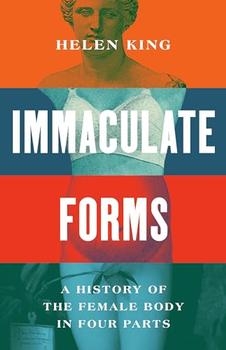
A History of the Female Body in Four Parts
by Helen King
"Never has medical history been more entertaining" (Dr Jennifer Gunter, author of The Vagina Bible) than in this turbulent history of women's bodies from classical Greece to the modern age.
Breasts, clitoris, hymen, and womb. Across history, these body parts have told women who they are and what they should do. Although knowledge of each part has changed through time, none of them tells a simple story. The way they work and in some cases even their existence have been debated. They can be seen as powerful or as disgusting, as relevant only to reproduction or as sources of sexual pleasure.
In Immaculate Forms, classicist and historian Helen King explores the symbiotic relationship between religion and medicine and their twinned history of gatekeeping over these key organs that have been used to define "woman," illustrating how conceptions of women's bodies have owed more to imagination and myth than to observation and science. Throughout history, the way we understand the body has always been debated, and it is still shaped by human intervention and read according to cultural interpretations.
Astute and engaging, Immaculate Forms is for everyone who has wondered what history has to say about today's raging debates over the human body and who is "really" female.
"King's thoughtful tome [addresses] how difficult it has been for women, having historically always been perceived as mysteries to themselves and to those who would seek to know them… King addresses how women have been defined, and how their bodies by their very existence resist those definitions." ―Financial Times (UK)
"A comprehensive and detailed historical account of the way in which four different parts of women's bodies – breasts, clitoris, hymen, and womb – have been viewed, interpreted, and treated by society, medicine, and the Church, mainly by men… impressive research." ―Church Times (UK)
"With erudition and cool wit, Helen King anatomises three millennia of Western commentary from doctors, teachers, and theologians about the female body. Males have tended to do most of the talking; now readers across the gender spectrum can find surprises and illuminations in this entertainingly comprehensive survey of what past generations knew, thought they knew, and often got wildly wrong." ―Diarmaid MacCulloch, author of Christianity
"In Immaculate Forms, King expertly weaves science, history, and culture to illuminate history and educate about the most misunderstood parts of our bodies. There is no better guide to trace the history of what we know and to make it relevant for us today. Never has medical history been more entertaining! Impeccably researched, thoroughly enjoyable, and filled with moments of surprise, this book will astound. Immaculate Forms is not just essential reading for those interested in science; it should be read by anyone interested in understanding how disinformation about women's bodies comes to be, and how it can be exploited." ―Dr. Jennifer Gunter, author of The Vagina Bible
This information about Immaculate Forms was first featured
in "The BookBrowse Review" - BookBrowse's membership magazine, and in our weekly "Publishing This Week" newsletter. Publication information is for the USA, and (unless stated otherwise) represents the first print edition. The reviews are necessarily limited to those that were available to us ahead of publication. If you are the publisher or author and feel that they do not properly reflect the range of media opinion now available, send us a message with the mainstream reviews that you would like to see added.
Any "Author Information" displayed below reflects the author's biography at the time this particular book was published.
Helen King is Professor Emerita of Classical Studies at The Open University. She is an elected member of the General Synod of the Church of England, where she is vice chair of Together, which campaigns on a range of discrimination issues including discrimination on the grounds of gender or sexuality. She is the author of Hippocrates' Woman and has published extensively on the history of women's health. She lives in Oxfordshire, England.
Your guide toexceptional books
BookBrowse seeks out and recommends the best in contemporary fiction and nonfiction—books that not only engage and entertain but also deepen our understanding of ourselves and the world around us.